|
|
|
Sort Order |
|
|
|
Items / Page
|
|
|
|
|
|
|
| Srl | Item |
| 1 |
ID:
128959
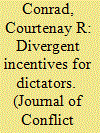

|
|
|
|
|
| Publication |
2014.
|
| Summary/Abstract |
Although they are arguably the worst violators of human rights, dictators sometimes commit to international human rights treaties like the United Nations Convention Against Torture (CAT) to appease their domestic opposition. Importantly, however, executives facing effective judiciaries must anticipate ex post costs that can arise when international treaties are likely to be enforced domestically. This suggests that one domestic institution-a political opposition party-may provide a dictator with incentives to commit to international human rights treaties and violate human rights, while another-an effective domestic judiciary-may constrain the dictator's ability to violate human rights and incentivize him to avoid international commitment. How do dictators make choices about commitment to human rights law and respect for human rights when they face conflicting domestic incentives? Furthermore, how do these divergent incentives affect compliance when dictators do commit to international treaties? In this article, I argue that the domestic incentives dictators face to support the CAT and engage in torture are moderated in countries with effective domestic judiciaries.
|
|
|
|
|
|
|
|
|
|
|
|
|
|
|
|
| 2 |
ID:
128956
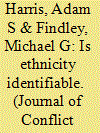

|
|
|
|
|
| Publication |
2014.
|
| Summary/Abstract |
Ethnicity is frequently posited as an important factor in civil violence and other political contexts. Despite the attention that ethnicity receives, its effects depend on an important, but mostly ignored, assumption that ethnicity is identifiable within and across groups. There is likely considerable variation in peoples' abilities to identify each other. Certain individuals within groups might be better at identifying others' ethnicities; further, different types of information might aid identification better. We contend that the strength of an individual's ethnic identity influences her ability to identify others correctly. We test this argument using an experiment in the Eastern Cape of South Africa in which individuals attempted to identify members of the major black ethnic groups. We find that the average individual struggles to identify ethnicity correctly in many conditions. Individuals with a stronger identity, however, are often better at correctly identifying the ethnicity of others relative to the average individual. When receiving contradictory information, individuals with stronger identities were sometimes deceived more easily than others. These results have implications for a diverse set of studies relying on the identifiability assumption.
|
|
|
|
|
|
|
|
|
|
|
|
|
|
|
|
| 3 |
ID:
128969
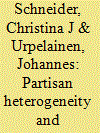

|
|
|
|
|
| Publication |
2014.
|
| Summary/Abstract |
This article analyzes the relationship between partisan heterogeneity and cooperation in international organizations. We argue that partisan heterogeneity increases distributional conflict among states during intergovernmental negotiations, thereby increasing the costs of cooperation. This decreases governments' willingness to contribute to cooperative efforts. We test the theory against data on governments' financial contributions to the European Development Fund. The empirical analyses robustly demonstrate that partisan heterogeneity reduces governments' incentives to contribute to European cooperation on international development. On a more general level, we offer new perspective on the role of domestic politics in international cooperation.
|
|
|
|
|
|
|
|
|
|
|
|
|
|
|
|
| 4 |
ID:
128971
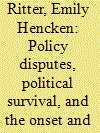

|
|
|
|
|
| Publication |
2014.
|
| Summary/Abstract |
Under what conditions will a state repress its citizens? The literature examining human rights violations lacks consensus over exactly how repression and dissent are interrelated. I argue that contradictions have arisen because scholars have not derived expectations consistent with modeling three common assumptions: (1) dissent and repression are causally interrelated (2) states and groups are in conflict over some policy or good and (3) authorities repress to remain in office. I develop a formal model based on these principles, and I predict that changes in the same independent variable can have divergent effects on the onset and severity of repression. Using coded event data for all states from 1990 to 2004 and a two-tiered estimator, I find that increases in executive job security decrease the likelihood that repression will occur in the first place, but increase the severity of observed violations.
|
|
|
|
|
|
|
|
|
|
|
|
|
|
|
|
| 5 |
ID:
128964


|
|
|
|
|
| Publication |
2014.
|
| Summary/Abstract |
Can endorsement of the ethos of conflict alter psychological effects of exposure to political violence? Israelis and Palestinians have been in a state of political and military turmoil for decades. We interviewed 781 Israelis and 1,196 Palestinians living in the West Bank, Gaza Strip, and East Jerusalem. Using structural equation modeling, we found that among those with a weak adherence to ethos of conflict, exposure predicted higher levels of hatred. For Israelis with a weak adherence to ethos of conflict, exposure predicted higher psychological distress and fear. For Palestinians with weaker adherence to ethos of conflict, stronger exposure predicted stronger threat perceptions. Israelis and Palestinians with a strong adherence to the ethos showed steady and high levels of negative emotions and threat, regardless of exposure. These results indicate that ethos of conflict is a double-edged sword that both protects and protracts the conflict. Although it serves as an engine fueling the conflict, it also plays a meaningful role as an empowering force for people suffering the psychological burden of an ongoing conflict.
|
|
|
|
|
|
|
|
|
|
|
|
|
|
|
|
| 6 |
ID:
128972
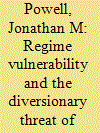

|
|
|
|
|
| Publication |
2014.
|
| Summary/Abstract |
In this article, I move beyond prior efforts to explore the relationship between the risk of a coup and international conflict by considering alternatives that leaders can utilize to strengthen their regimes. I offer two theoretical expectations. First, I theorize that leaders lose the incentive and ability to use diversion when the structural coup-proofing apparatus is strengthened. Second, I expect military finances to lead to disparate behavior when considering regime type. Autocrats are expected to use military funds to provide private incentives to the armed forces, largely in the form of allowances. Democracies, in contrast, will be required to use expenditures to promote the public good of national security due to the transparency of their regimes. Autocrats are expected to lose the incentive to use diversion as the financial endowment of their militaries increase, while democracies will continue to show a diversionary trend due to their increased military capabilities. The theory is tested using global data from 1962 to 2000, with the findings strongly supporting the theory.
|
|
|
|
|
|
|
|
|
|
|
|
|
|
|
|
| 7 |
ID:
128966
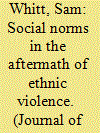

|
|
|
|
|
| Publication |
2014.
|
| Summary/Abstract |
This study considers prospects for the revitalization of social norms after ethnic violence using a behavioral experiment in postwar Bosnia. In the experiment, subjects are asked to distribute a ten-unit monetary sum between two anonymous recipients of random ethnicity. The results indicate a surprisingly high number of egalitarian distributions across ethnicity, which is interpreted as evidence of a norm of fairness. Discriminating behavior in the experiment is explained as a product of ethnic parochialism (rewarding co-ethnics and punishing non-co-ethnics). Overall, the experiment speaks to the resiliency of an important aspect of pro-social behavior after violence-impartiality in the treatment of others.
|
|
|
|
|
|
|
|
|
|
|
|
|
|
|
|
|
|
|
|
|